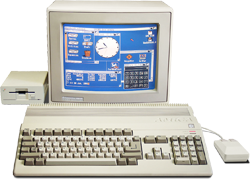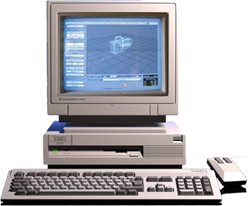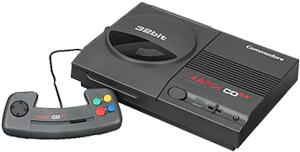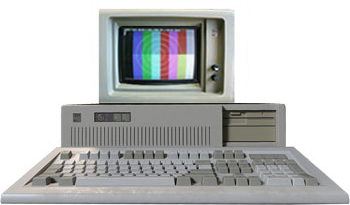A4000 -The Holy Grail of Amiga Computing
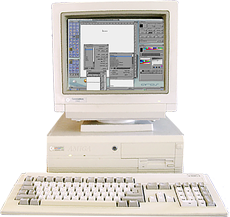
Released in October 1992 by Commodore, the Amiga 4000 (A4000) represents the pinnacle of classic Amiga computing. As the most advanced and final Amiga model of its era, it combines a powerful 32-bit architecture, high-resolution AGA graphics, and a deeply expandable hardware platform. Fully compatible with earlier Amiga software, the A4000 opened new horizons for productivity, multimedia, and gaming.
Built with expansion in mind, the A4000 supports accelerators, RAM upgrades, CD-ROMs, graphics and sound cards, and even PC compatibility via 486DX co-processor boards.
- Original price: $3,700 (A4000/040) or $2,400 (A4000/030)
- Inflation-adjusted: ~$7,620 and ~$4,900 respectively
- Total units sold: Approx. 35,000 desktop models, and only 3,000 A4000T tower models
- Only 200 A4000T units were sold directly by Commodore — the remainder were distributed by Escom after 1995
![]() THE A4000 AT A GLANCE
THE A4000 AT A GLANCE
- CPU: Motorola 68030 (25 MHz) or 68040 (25 MHz) in desktop models
- Tower models: 68040 or 68060 CPUs
- OS: AmigaOS 3.0 / 3.1 with preemptive multitasking (no memory protection)
- Graphics: AGA chipset (24-bit, 16.8 million colors)
- Sound: 4-channel 8-bit PCM (up to 57 kHz)
- Memory: 2 MB Chip RAM and up to 16 MB on-board Fast RAM, up to 128 MB via CPU slot, and additional RAM via Zorro III cards
- ROM: 512 KB Kickstart
- Drives: Internal 880 KB floppy
- Expansion: 5 × Zorro III slots, 4 × 16-bit ISA slots, and 2 × AGA video slots
- Storage: Replaces the older SCSI with Parallel ATA (IDE)
 Amiga 4000 Desktop Models
Amiga 4000 Desktop Models
There are two main A4000 desktop models:
Amiga 4000/040
- Released: October 1992
- CPU: Motorola 68040 @ 25 MHz
Amiga 4000/030
- Released: April 1993
- CPU: Motorola 68EC030 @ 25 MHz
Amiga 4000 Tower
The A4000T, released in 1994, brought workstation-level flexibility in a full tower format. Initially launched with a 68040 CPU, the model was reintroduced in 1995 by Escom with a 50 MHz Motorola 68060, remaining in production until 1997.
- 16 MB onboard RAM, up to 128 MB on CPU cards, and more via Zorro slots
- Unique for having both a built-in IDE and SCSI interfaces
- Supports up to 6 internal drives
- Expansions include 2 AGA video slots, 5 Zorro III slots, and 4 ISA slots
 Colors & Graphic Modes
Colors & Graphic Modes
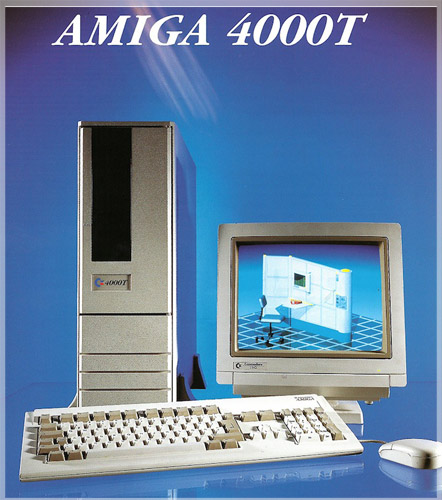
The A4000 features Commodore’s Advanced Graphics Architecture (AGA) chipset, offering cutting-edge graphics on par with the CD32 and A1200:
- 24-bit color (16.8 million colors total)
- Up to 256 on-screen colors (up to 262,144 colors in HAM-8 mode)
- Resolutions from 320×200 to 1504×576 (PAL overscan)
- VGA output support (640×480)
- Enhanced hardware sprites and smooth scrolling over previous Amiga chipsets (OCS/ECS)
![]() Audio Capabilities
Audio Capabilities
The A4000 carries forward the classic Amiga audio hardware:
- 2 stereo channels (4 × 8-bit PCM)
- Sampling rate: 28 kHz, with potential for up to 57 kHz
- Independent volume control per channel (65 levels)
- Software-controlled low-pass filter for audio enhancement
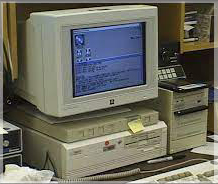
 Ports & Connectivity
Ports & Connectivity
- 2 × 9-pin mouse/joystick ports
- 5-pin DIN keyboard input
- RGB video output (DB-23)
- Stereo RCA audio out + 3.5 mm headphone jack
- RS-232 serial port (DB-25M)
- Parallel port (DB-25F)
- SCSI-2 (DB-50F high-density) on tower models
Expansions Slots
- 5 × Zorro III 32-bit slots (Amiga-native cards)
- 4 × ISA slots (via bridgeboard for PC compatibility)
- 2 × AGA video slots
- CPU slot for accelerators and coprocessors
- 4 × SIMM slots for Fast RAM (72-pin)
 Monitor Compatibility
Monitor Compatibility
The A4000 can be used with a wide range of display options:
- Commodore RGB monitors (e.g., 1084, 1942)
- RGB monitors (Philips CM 8833, etc.)
- 15 kHz VGA monitors (via RGB-to-VGA adapters like BenQ)
- TVs using SCART cables
- Modern VGA/HDMI displays with upscalers like Indivision AGA
 Upgrades & Add-ons
Upgrades & Add-ons
With the right add-ons, the A4000 becomes a powerhouse:
- Fast RAM (8 MB or more) and SD card-based storage for WHDLoad
- Accelerators: 68040/060 boards
- Graphics cards: Picasso IV, ZZ9000
- Video scalers: Indivision AGA
- Audio cards: Prisma Megamix, ZZ9000AX, SoundBlaster
- Network cards
- PC compatibility via 80286/386/486 expansion cards
- Video Toaster for broadcast-level video editing
- Optical drives: Internal CD-ROM
- Modern storage: Gotek (USB floppy emulator), ZIP drives
■ Amiga 4000
G.P. for Binaryvalue.com 2022 (c)














 TOP-10 APPS
TOP-10 APPS